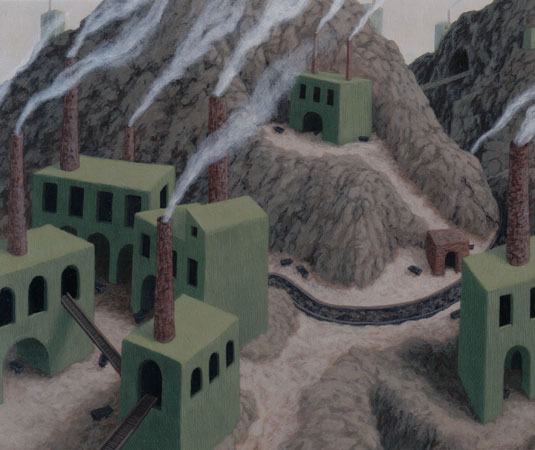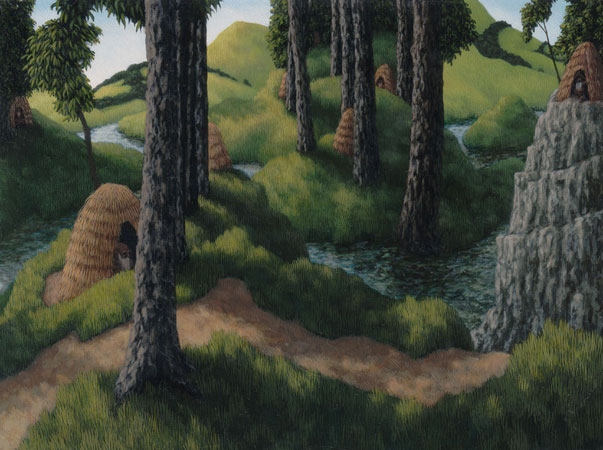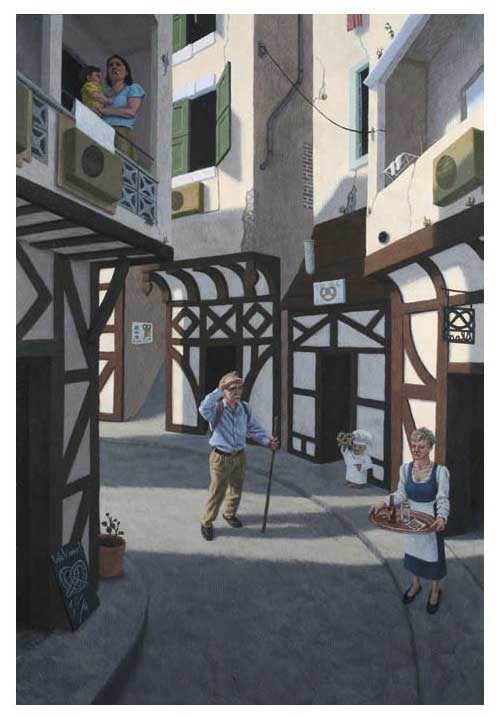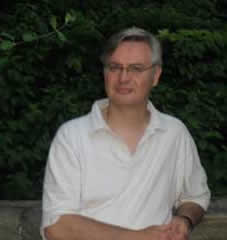Three Poems After Paintings by Nora Sturges
Marco Polo Arrives at Samarcan (2007), 12˝ × 8˝, oil on MDF
Marco Polo Arrives at Samarcan
It’s not like Moriana: no one cares
that you’ve arrived beyond the Caspian Sea
on streets that look—well, German.
Where are the mosques an Empire worshipped in?
Or did the Saracens return from exile
thrilled by German culture, former cares
exchanged for an adopted heritage?
The walls—white stucco, crossed with wooden beams,
typically German—advertise obsessions
of the Northern climes: pretzels and beer.
Is everybody German? No one cares
to greet some out-of-towner who, confused,
stops dead: is this a joke, some tourist trap
designed for kids or German fugitives?
How strange to find in Samarcan a beer-hall
barmaid straight from Hamburg and—it scares
you—knee-high, this chef statue with its prize:
Infinity revised in salted dough.
Pretzel or maze? You’ve lost your appetite.
The sign said this was Samarcan….But what
if all the signs are lies, and no one cares?

In Former Times, Thebeth Was Flourishing and Productive, 2004, 5"x6", oil on panel
In Former Times, Thebeth Was Flourishing and Productive
An entry in Marco Polo's journal
Time as we know it, Reader, has no meaning.
Take Thebeth, its pea-green factories
and smokestacks coughing white streams toward the sky—
Could there have been a sight more beautiful?
Coal-carts slid over tracks, an endless chain
that stretched up from the earth (Time had no meaning),
bearing forth black ore from caves carved out
of mountains, cliffs, the Himalayan spurs.
But now the carts that carried it are still,
the men who mined it gone back underground,
long dead, their families fled: Time holds no meaning
for those it’s erased.
Today, we find
young monks, red-robed, who surge from monasteries
to beat back the crowds: pilgrims who cower,
seeking the best hotels, the Dalai Lama,
or a state where Time is meaningless,
a quest that might take up to several lifetimes.
All well and good; but if the past is guide,
its glory and material wealth restored
Reader, Thebeth will flourish once again,
despite this waste of time, your search for meaning.

Traveling in a Direction Between NE and E, One Passes Through a Country Inhabited
by Ascetics, 2004, 5:x6.75", oil on panel
Travelling in a Direction Between NE and E, One Passes
Through a Country Inhabited by Ascetics
An entry in Marco Polo's journal
Reader, if you could strip away all falsehood
from a nation’s land and populace,
all rivalries and inessential labors
that becloud the vision of the weak
and not-so-weak, what country would be left?
Reader, if you could strip away all falsehood
and behold the world anew—pure streams,
lush foliage that, to a beginner’s mind,
exist right now, inseparable from us—
would you—could you—if you foresaw the price
of doing so was to renounce as falsehood
silken sheets, your incense-bearing trees
and royal guard, the pleasures of the flesh?
If so, only one country would be left:
a nation where your wives, the sons you fathered,
trail away like smoke, where falsehood founders
on the Noble Truths, and bamboo huts—
concentric, hive-like—hold unshaved ascetics
luminous in solitude, minds clear,
dazzled by lute-song, love…A country yours,
Reader, if you could clear your eyes of falsehood.
—Ned Balbo, Baltimore, MD



